‘Do Less, Live More’ Made Possible With Yasmine Djoudi of Ikkai
One French Woman's Dream to inspire Japan's next generation
"What if there was a platform to connect me, a student who has some time (but no money) and looking for a place to exercise my skills, and a person/company who has money (but no time) and needs a one-time help?" These were the initial thoughts that ran through Yasmine Djoudi’s mind while still a student in Fukuoka. A few years later, she and her partner now run a company that does exactly this (and more) under the motto: 'Do Less, Live More." Here's her story.
At 26, while on a student exchange program to Fukuoka from her native France, Yasmine Djoudi observed a way she might help address two of Japan’s pressing problems: a culture of long working hours that impedes work-life balance and a shortage of talent caused by an aging population.
Her idea was simple: to establish a website offering students one-off tasks for cash and experience to help them in their future careers. Those who posted the gigs, on the other hand, could get their chores done and have more free time to enjoy themselves. She gave the website the name ikkai (the Japanese expression for one time).

Yasmine at ikkai’s office in central Fukuoka.
An immediate hit with students, the marketplace was expanded nationwide and Djoudi added an additional service, Career by ikkai, designed to help students into internships and find their first job on graduation. Now the Fukuoka-based entrepreneur has her sights on setting up a team in Tokyo to grow the business.
But Djoudi’s journey has not been without challenges, including overcoming stereotypes, adjusting to new business methods and finding her own work-life balance. Savvy Tokyo met the young entrepreneur to find out more.
What brought you to Japan?
I’ve always been attracted to Japanese culture. When I was a student at a business school in France we had to do an exchange program in a different country. I worked really hard to have the best grades to be able to choose Japan. My business school was in Bordeaux, which is a sister city of Fukuoka, so I ended up there.
What was the spark for your business?
I got the idea in Fukuoka in 2014 and, with my co-founder, decided to create it. But we had to leave Japan after our exchange program. We lived in New York for a year, to finish our studies and do an internship. From the start of 2015, we went to Starbucks every day after our internships and worked on our business idea until the store closed. Mid-2015, we came back to Japan and began doing marketing and research. Finally, in February 2016, we registered ikkai inc.

Teamwork: Yasmine and ikkai co-founder Thomas Pouplin are partners in business and in life.
How has the business evolved?
At first, we didn’t have a budget for promotion, so it was difficult to let people know about the marketplace service. Also, Japanese people had a bit of trouble with letting a stranger into their house to do chores. But some clients talked about ikkai to their friends and it got much better.
From the start of 2015, we went to Starbucks every day after our internships and worked on our business idea until the store closed.
Although our main goal was to help individuals, we realized that many companies were finding us and posting tasks. Companies have needs that they were searching online to have fulfilled, so we started to focus on attracting companies.
Then we realized that each time a student completes a task, we got data about his or her skills and experience, which could help all students. So, we opened a second service on our website called Career by ikkai. We use the data we get on the marketplace to help the students get internships and positions after graduation.
Think about your career: Yasmine and Thomas conducting a seminar at Fukuoka Women’s University.
Why did you decide to move into recruitment?
In Japan, the biggest problem for recruiters is retention of new staff. Within three years, 30 percent of new graduates quit their graduate job because they and their company don’t match. We really want to avoid that. We really want each student to find a role that inspires them and allows them to thrive. That’s why the data we focus on is not only on students’ skills but also on their personality and interests, to help them find not just a job, but the right job.
Within three years, 30 percent of new graduates [in Japan] quit their graduate job because they and their company don’t match.
Through ikkai, we want them to skill-up and uncover what they would like to do in life. We’ve merged our services, so they can find everything in the one place: one-time gigs, internships, graduate jobs and even some seminars we hold with local companies.
What challenges have you faced?
One was language because neither my co-founder nor I are fluent in Japanese, so we hired Japanese interns and Japanese staff early on. Another challenge was to find Japanese staff who are fluent in English as there are fewer such people in Fukuoka than in Tokyo.
The ikkai team poses together for a one-time photograph.
For marketing and communications, we had to relearn everything. We have been educated mainly in France and America, but in Japan the market is different. In Japan, we were told that our simple homepage design wouldn’t work. Japanese people don’t trust a website when there is not enough information right away, and they don’t like clicking; they like to have everything on the homepage. Design-wise, we were really against that, so it has been difficult for us to adapt and do what is better for the business.
Companies tell us all the time that it isn’t working, but they don’t know how to change it.
Our industry is old-fashioned. The gig economy is not well established in Japan and it is difficult to convince people to try a new concept. The current recruiting system also doesn’t suit modern needs. Companies tell us all the time that it isn’t working, but they don’t know how to change it. It’s indeed difficult for people to accept new ideas but I feel that they can accept change better from foreigners as they have a different way of recruiting than Japanese people.
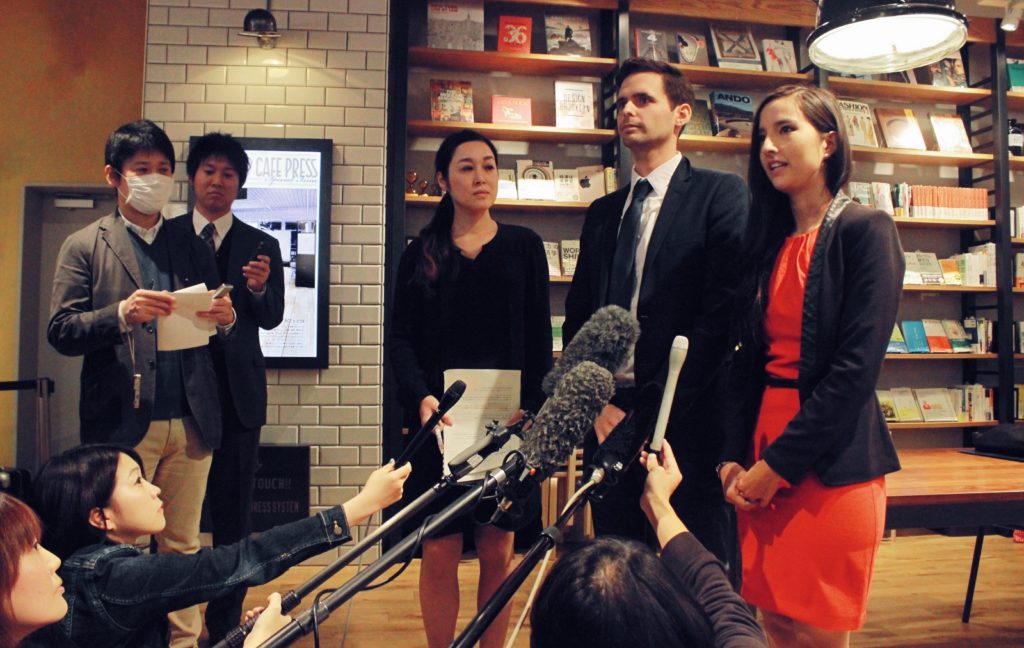
Yasmine and Thomas talking to the local media in Fukuoka about their business.
What plans do you have in Tokyo?
As our platform is nationwide, we have a very good network in Tokyo already, with many university students, mainly from Waseda, Hitotsubashi and Todai [Tokyo University], but we’re searching for a sales team in Tokyo. My co-founder and I come here every month. Fukuoka is a great city in which to start up a business, but we need more companies to be involved so that means we also need to be in Tokyo.
How has being a woman impacted the business?
In Japan, especially in Kyushu, it’s still difficult to be a woman. People don’t respect you as much as they would a man so this helped me to really grow. I’ve become much stronger.
Sometimes I give lectures on entrepreneurship at universities. The female students tell me they thought it was impossible for a woman to start a business, but they now see it is possible. The feeling that I can inspire young women to start their own business one day is really satisfying.
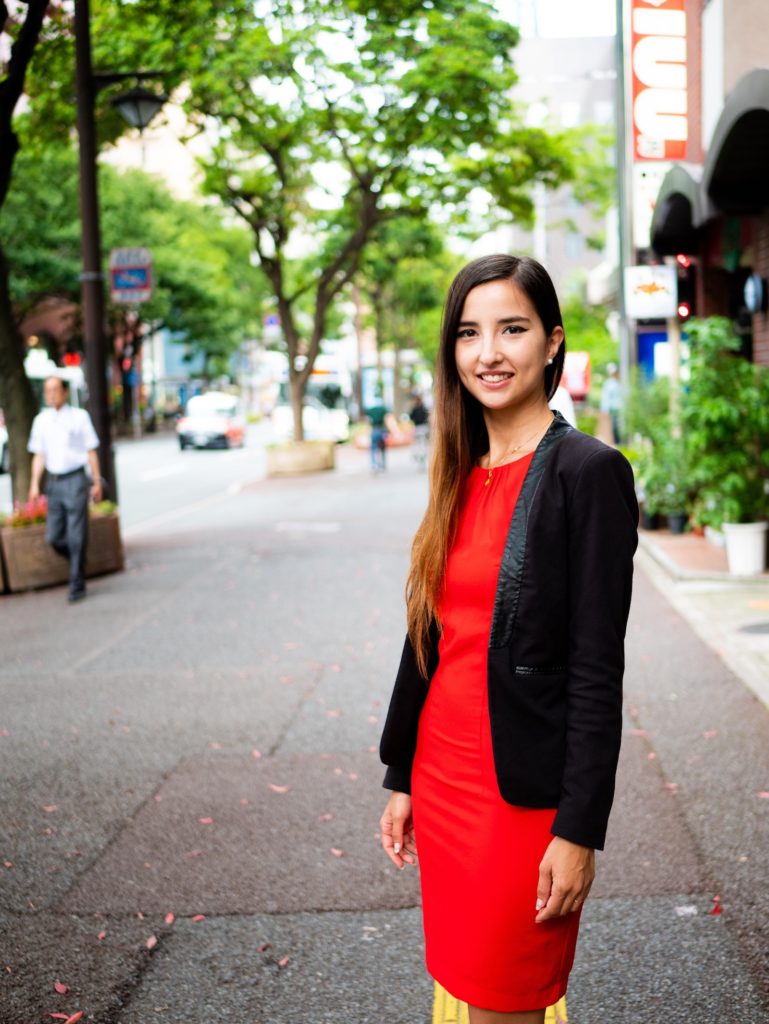
Though being a young woman entrepreneur is more often difficult than not, Yasmine says that knowing that she can inspire young women to start their own business one day “is really satisfying.”
What do you do in your free time?
I love going to the movies. I love singing; I used to be in a professional opera every summer. I go out with my friends and love chilling on my couch with my boyfriend, who is also the ikkai co-founder. I also go to the gym almost every day.
The female students tell me they thought it was impossible for a woman to start a business, but they now see it is possible.
How do you achieve work-life balance?
Since my boyfriend is my co-founder, even in our private time we talk about the business. We are passionate about entrepreneurship so it’s difficult to have a work-life balance when everything is merged. But it’s merged in a healthy way. We still take time to do stuff that is not job-related, like going to the movies. And, because ikkai is our passion, it doesn’t feel like work.
For more information about ikkai, see the company’s official website here.
Savvy Spotlight is a monthly feature introducing foreign and Japanese women at the frontline of what’s successful, contributing, cool, unique and interesting in the city. If you have anyone in mind you would like us to interview, leave us a comment below with your recommendations!












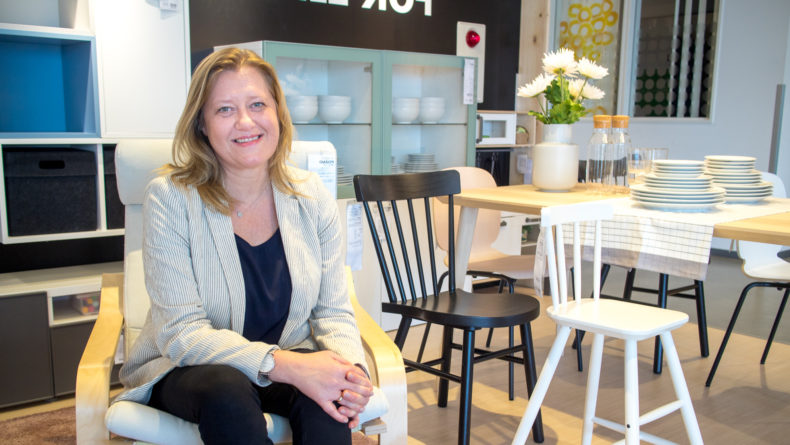
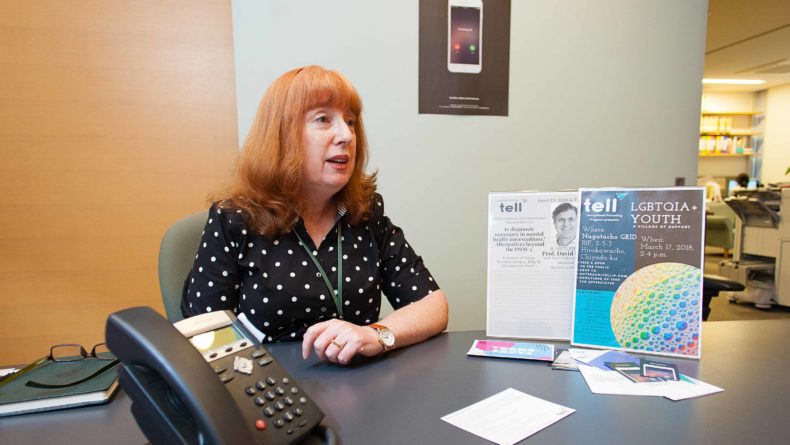
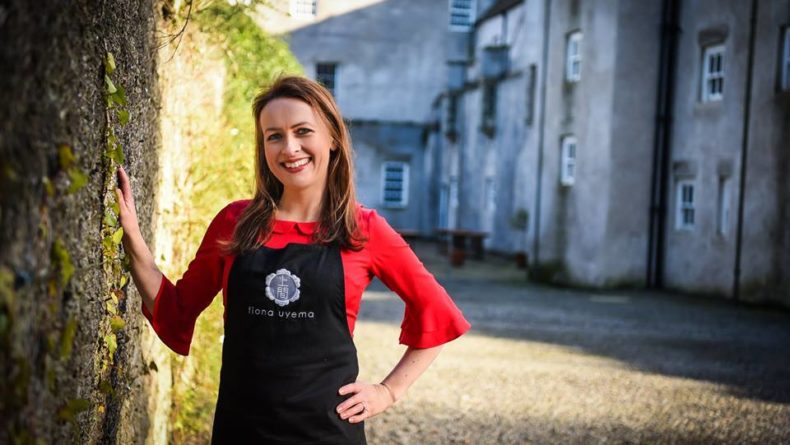
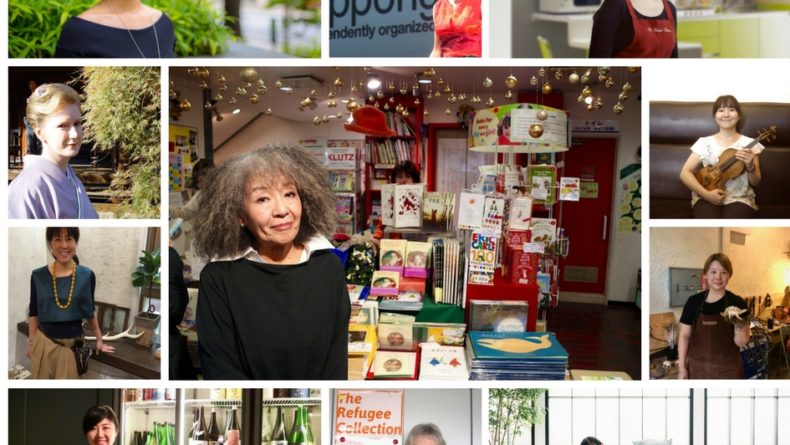
Leave a Reply